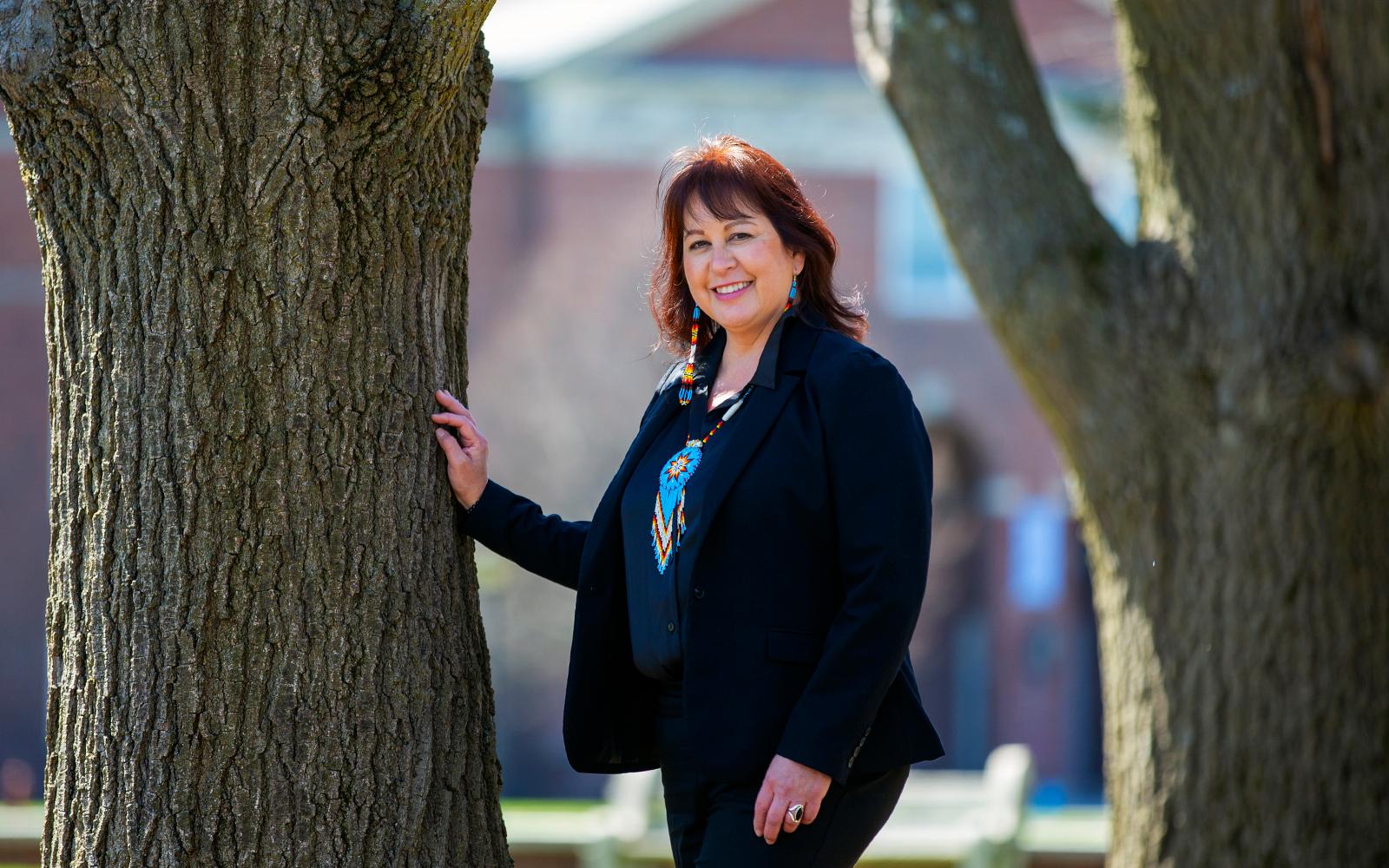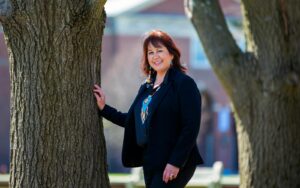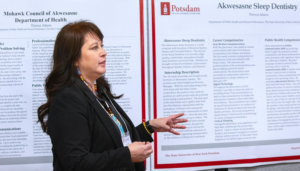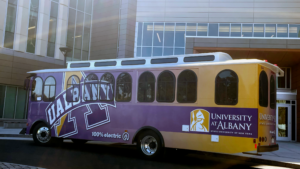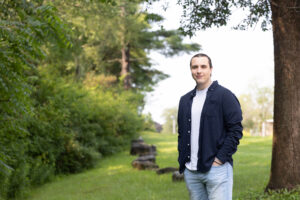Updated July 24, 2024.
Pursuing higher education has no set timeframe and no strict gameplan. Life happens, priorities change, and careers take different directions. The number of adult learners returning to colleges nationwide continues to grow, including at SUNY, where more and more students over 25 are enrolling to earn a degree or certificate. Whether it is a student looking to boost their earning power, switch careers, or finally earn their degree, there is a place for them at SUNY.
From online degrees, industry certifications, and microcredentials to flexible class schedules, on-campus childcare, and convenient locations, SUNY is constantly finding new ways to support students juggling life, work, and family. Whether you want to pursue a degree fully online with one of our 900+ programs, or upskill your resume and career competencies with flexible microcredentials, SUNY has the programs, staff, and supports in place to ensure all of our students find success as they build their futures.
Our adult learners come from various backgrounds and have different career goals, but all have one thing in common: they are achieving their dreams at SUNY. Meet four students that represent just a few of the thousands of stories being written every day across New York State.
Time for a change
After hearing the buzz about Micron making its way to Central New York, Robert “RJ” Tinsley made a decision to enroll at Onondaga Community College for the second time.
“I had no idea what I was looking at but thought if they could teach me, I’d be really interested. I was hooked right there. I registered on my phone, figured out a schedule that would work for me, and that’s all she wrote!” – RJ Tinsley
He started in the Business Administration program, eventually switched to Communications, and after two years transferred to SUNY Cortland. He completed his bachelor’s degree in Communication Studies there in 2021, then returned home to the Liverpool area. He interviewed for various positions, tried different types of work, but for more than four years had one consistent job as a delivery driver for Francesca’s, a highly-regarded Italian restaurant with locations in Syracuse and Liverpool
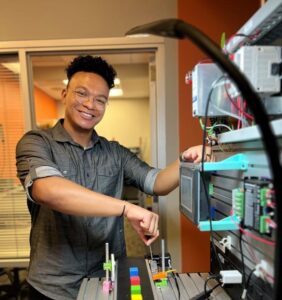 He went to OCC’s Open House, listened to professors talk about the new Micron-related Electromechanical Technology programs that would be coming, and toured the Whitney Applied Technology Center where the classes would be taught. “I had no idea what I was looking at but thought if they could teach me, I’d be really interested. I was hooked right there. I registered on my phone, figured out a schedule that would work for me, and that’s all she wrote!”
He went to OCC’s Open House, listened to professors talk about the new Micron-related Electromechanical Technology programs that would be coming, and toured the Whitney Applied Technology Center where the classes would be taught. “I had no idea what I was looking at but thought if they could teach me, I’d be really interested. I was hooked right there. I registered on my phone, figured out a schedule that would work for me, and that’s all she wrote!”
This fall Tinsley returned to OCC as a member of the first group of students in the new Electromechanical Technology degree program. Early in the semester, Professor Mike Grieb who is Chair of Applied Engineering Technology at OCC, visited class and told students about paid internship opportunities at Micron. Tinsley applied and was selected for an interview.
On October 30, exactly one year and 3 days after the President’s appearance at OCC, Tinsley learned he had been chosen. He will spend the summer of 2024 in Boise, Idaho, working for Micron as a paid intern in the role of Intern Process Technician. It’s an opportunity which may lead to a career with the microchip-maker.
Interested in a career in the hyper-growing semiconductor industry? SUNY has a program for you.
Start your future in the growing semiconductor industry with degrees, certificates, and training programs
Serving while learning
Recent Empire State University graduate Julianna Merendino is an active member of the United States Navy, inspired by her family who are mostly members of the Navy and Marine Corps. Inspired by her grandmother, Merendino joined the Navy and never looked back.
This spring, Merendino earned a bachelor’s degree in criminal justice at Empire State University and graduated in May. While she was a student, she worked as a funeral honors coordinator for the U.S. Navy and often had to drive across the state for different services, making a traditional classroom environment more challenging.
“The resources were there to figure out what I, as a service member, would be entitled to.”
– Julianna Merendino
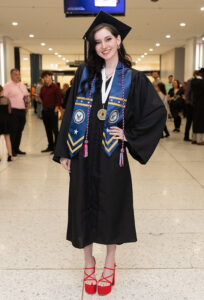 Merendino said the flexible class options and military-related services offered at Empire State University through the Veteran and Military Resource Center were key to her success. Empire State University serves over 1,000 military-affiliated students, the most of any State University of New York Institution, and works to support those students through different programming and resources with the Veteran and Military Resource Center.
Merendino said the flexible class options and military-related services offered at Empire State University through the Veteran and Military Resource Center were key to her success. Empire State University serves over 1,000 military-affiliated students, the most of any State University of New York Institution, and works to support those students through different programming and resources with the Veteran and Military Resource Center.
“The resources were there to figure out what I, as a service member, would be entitled to,” Merendino said. “That was one of the big reasons why I ended up going with SUNY Empire because I looked at other schools and they were not as accommodating. They made it sound like it would set me back and they wouldn’t recommend me to do the exact degree and things I did here.”
Merendino plans to eventually go back to school for her master’s degree and hopes to work in cybersecurity.
“It feels amazing to have accomplished it while working full-time and doing the things I did,” Merendino said. “I know a lot of people don’t think they have the ability to do it, but if they jump right in like I did, it’s completely possible.”
Coming back to the start
A Mohawk grandmother and single mom who worked for nearly 30 years at Kanonhkwa’tsheri:io, the Akwesasne Dental Clinic, Theresa Adams was hesitant to pursue her lifelong dream of completing an advanced degree in higher education. A decade had passed since she had been accepted to SUNY Potsdam with the hope of completing a teaching degree. That dream had been put on the backburner to help her sons complete college.
On the road to SUNY Potsdam, Adams earned the role of district chief in Akwesasne and worked for several years as a public safety dispatcher. While attending classes at Potsdam, she has worked two jobs, and her dental projects with First Nations people span two internships.
As Adams stepped forward to receive her diploma this spring, it was certain that, among the many academic and personal milestones she has met and examples she has set, she has helped improve dental care for First Nation people who don’t easily receive it in the remote, underserved region of Canada they call home. Adams was drawn to pursue this SUNY Potsdam service-learning project by a mystery she observed during her job
at the Adolescent Treatment Centre in Akwesasne, working among youth who had traveled to the center from the northern remote First Nations communities Cree Territory in Nunavut.
“For 30 years, I have been teaching the community on oral health initiatives, and the importance oral hygiene has on the overall health of a person. I want to go a step further and be able to identify the consequences of bad oral from mental, physical, and even spiritual perspectives. Public Health is where I can be a community advocate.”
– Theresa Adams
Besides assessing needs using virtual meetings and discussions, Adams is working with Sleep Clinic for Kids to create dental education materials for high-risk students in under-resourced areas. She has met virtually with dental health practitioners in Nunavut while planning for an in-person visit to the community, where she will host dental health promotion events, assist with data collection from screenings, and help draft a plan for future care of the children of Nunavut—including the possibility of mobile dental care units traveling across the territory.
The value of applying learned skills, solving real-world problems, and witnessing tangible results is fairly well incalculable—and so important that it drives basic philosophies underpinning Potsdam’s emphasis on applied learning. While Adams’ wealth of lived experience helped her identify and navigate her chosen challenge, hundreds of other Potsdam students find their own projects help prepare them to be engaged citizens in ways they had not imagined.
As she looks ahead to a bright future helping others experience fuller living through better health, Adams is excited to pursue her master’s degree in Public Health, work with policy makers, and focus her efforts on under-resourced areas and populations.
Intending to take an interdisciplinary and practical approach, Adams has identified key tools—including needs assessment, collaboration, and partnership building. It is big work. When she needs to, Adams finds strength woven through centuries, down her mother’s line, and draws particularly from her mother’s sense of the wisdom found in kindness.
“My long-term goals are to be a Public Health facilitator,” she said. “My plan is to facilitate health education and empower individuals to take charge of their health. For 30 years, I have been teaching the community on oral health initiatives, and the importance oral hygiene has on the overall health of a person. I want to go a step further and be able to identify the consequences of bad oral from mental, physical, and even spiritual perspectives. Public Health is where I can be a community advocate.”
Advancing a career to help others
Helping others is at the center of the work Timothy Johnson does in his professional and academic life.
Johnson has been working for New York City in various roles for nearly 30 years. Currently, he serves as a department of corrections captain in the correction industries division. In his role, he supervises 17 corrections officers and manages a $1.3 Million budget for his area. This year however, marked a change for Johnson, as he graduated from SUNY Empire this spring with an associate’s degree in General Studies. 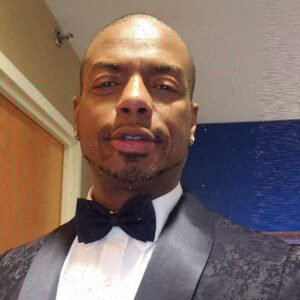
“In my profession, we are trained to deal with diversity, equity, and inclusion as it pertains to staff and people in custody on Rikers Island. This type of work makes me feel great, that I can help someone no matter the cause.” – Timothy Johnson
While earning his associate’s degree is cause for celebration, Johnson is not quite finished with his education. He’s set to cross the stage again this December, this time with a bachelor’s in Criminal Justice. On top of his responsibilities outside of class, he is heavily involved in the Black Male Initiative, joining the group in 2012, and the Diversity, Equity, and Inclusion Council at SUNY Empire. His work experience and coursework make him well prepared to help others.
As he continues his education and community service with Empire State University, he said it’s important for people to realize that anyone can continue their education and pursue their goals.
“If I can do it, so can you. Never stop believing in yourself and live your truth.”
Building skills to move forward
Throughout any career, there are times when you need to learn new skills or earn national certifications to help you keep pace or advance. For Danielle Pino, enhancing her career was high on the to-do-list.
Pino works as a habilitation specialist at Family Residences and Essential Enterprises at Saddle Rock Ranch on Long Island. Every day, she serves adults with disabilities, helping them live independently and actively take part in their community.
“I found a fulfilling career where I can help others achieve more while also getting into the community and getting myself out of the classroom.” – Danielle Pino
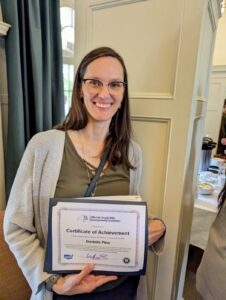 While her job has been fulfilling on a personal level, she was on the lookout for a way to advance her career and showcase the specialized work she takes on as a Direct Support Professional. That pursuit brought her to Farmingdale State College.
While her job has been fulfilling on a personal level, she was on the lookout for a way to advance her career and showcase the specialized work she takes on as a Direct Support Professional. That pursuit brought her to Farmingdale State College.
Thanks to a partnership between SUNY and the NYS Office for People with Developmental Disabilities, (OPWDD), FSC is one of 21 campuses offering a series of grant-funded microcredentials providing college credit and national certifications.
With encouragement from her employer, Pino jumped at the chance to add the series to her resume. “I hope this program is the beginning of a new era for Direct Support Professionals,” Pino said. “One where we are viewed as the hard working specialists we are, and appreciated for the amazing work we do every day.”
Through the classes, quizzes, and national certification requirements, Pino and her classmates have gained a better understanding of the people they serve and have learned new ways to develop deeper connections with co-workers and the community they serve.
While she completed the first stage of the DSP Microcredential, Pino isn’t done there. She’s excited to start the second tier of the program this fall and pursue the DSP-II microcredential. Along the way, she is also earning college credits through the program, starting her on the path towards a degree in psychology from FSC.
Pino added, “I never thought writing testimonials for a national certification while also spending hours studying Sigmund Freud for Psychology 101 course credits and a weekly drive to Farmingdale for a 3 hour in-person Psychology course would be the key to increasing my resilience. But that is exactly what happened in the end.”
For Pino, a DSP microcredential is the right step forward in a rewarding career.
Learn more about the SUNY DSP Microcredential series and see how it can fit your career.


